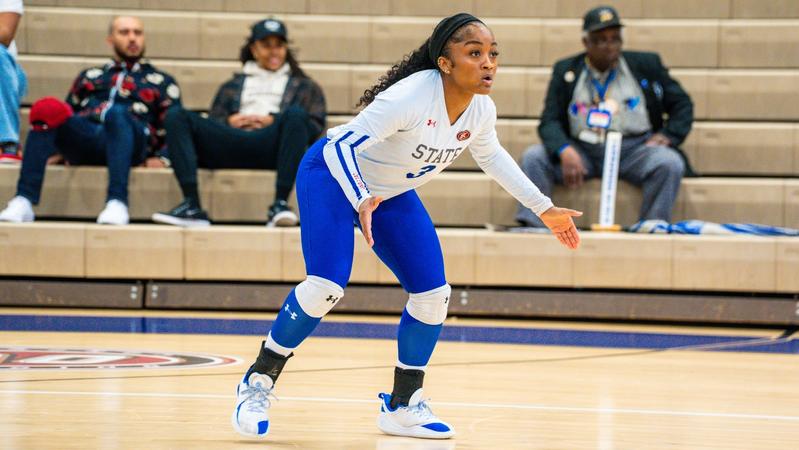NIL
LSU softball adds two experienced transfers following early NCAA Tournament exit
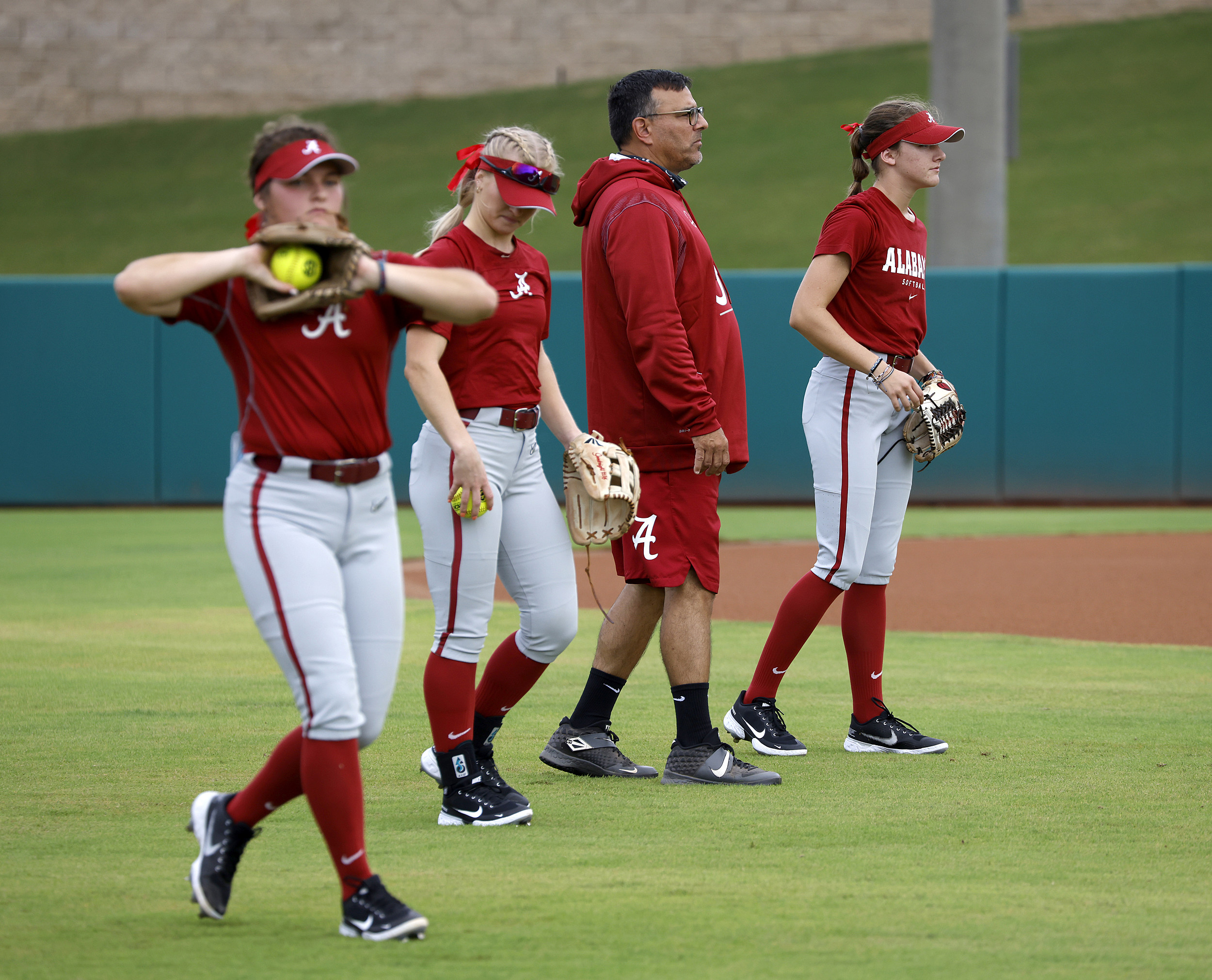


LSU softball added two high-profile transfers in shortstop Kylee Edwards and pitcher Cece Cellura. Both players announced their move on social media this week.
The pair brings a combined four years of starting experience to a team that fell short of expectations in 2025. Edwards made the in-conference move from Mississippi State, while Cellura comes from San Diego State.
Advertisement
Edwards, a rising junior, batted .280 through two seasons with the Bulldogs. As a sophomore, she finished with 47 hits, 37 RBI and 24 walks with a .945 fielding percentage at shortstop. She finished with All-South region second-team honors.
In a first-team All-Mountain West season, Cellura finished with a 2.28 ERA and 19 wins. She made 39 appearances, including 20 starts, as a sophomore in 2025. Through 153.2 innings pitched, she accumulated 94 strikeouts and three saves. Hitters batted .248 against her as she led the Aztecs to their third-straight conference tournament title.
After an earlier-than-expected exit from the NCAA Tournament, LSU added two proven talents to its roster.
This article originally appeared on LSU Wire: LSU transfer portal: Softball makes two key additions
NIL
Greg McElroy states Fernando Mendoza is the best college football quarterback since Joe Burrow

Former Alabama quarterback turned ESPN analyst Greg McElroy delivered one of the boldest quarterback evaluations in recent college football memory. He’s placing Fernando Mendoza in rare air during the latest episode of Always College Football.
According to McElroy, Mendoza’s current level of play puts him in a category few have reached over the past decade: “This is not the traditional Indiana football,” McElroy said.
“This is a Madden simulation that’s set on rookie difficulty. Fernando Mendoza at the center of it all. He is not just physically gifted, but he has that Ivy League processing.”
McElroy went a step further, comparing Mendoza’s efficiency and command of the offense to the very best quarterback season of the modern era: “I look at him and I know there’ve been some great quarterbacks in the last five years, like Caleb Williams, Bryce Young. A bunch of incredible football players,” McElroy added.
“But this to me feels like one of, if not the best quarterbacks we’ve seen in college football since Joe Burrow.”
Of course, that’s a lofty comparison. Burrow’s rise at LSU was well documented, but Mendoza’s rise has been one of the most compelling storylines in the sport.
After transferring from Cal to Indiana, he immediately took control of the Hoosiers’ offense, leading it with surgical precision. McElroy highlighted Mendoza’s completion percentage north of 73 percent as evidence of his elite efficiency and decision-making.
“He becomes the CEO of the offense,” McElroy explained. “His story is kind of Shakespearean in some ways.”
That efficiency was on full display in Indiana’s Peach Bowl matchup against Oregon, one of the nation’s top defenses. Facing a unit ranked among the best in pass defense, Mendoza delivered a near-perfect performance.
“He was a cool 17-for-20 for five touchdowns,” McElroy delineated. “That is clinical execution and it just kills you every single snap.”
Moreover, McElroy emphasized Mendoza’s ability to diagnose defenses before the snap, punish coverage mistakes instantly and anticipate windows before they open. Things that have the Indiana offense rolling at the moment.
“He anticipates your move and then boom. He punishes you before the ball even leaves his hand,” McElroy explained.
Beyond the arm talent, McElroy also pointed to an underrated aspect of Mendoza’s game in his mobility. With 429 rushing yards and six touchdowns this season (excluding sack yardage), Mendoza has consistently extended drives with his legs.
“He’s not a burner, but he’s football fast,” McElroy stated. “He’s slippery. You think you’ve got him bottled up on third-and-three, and then boom, he falls forward and it’s a first down.”
As Mendoza continues to carve up defenses, McElroy’s assessment underscores just how special Indiana’s quarterback has become. His name is now being mentioned alongside the very best the sport has seen in the past decade, but we’ll see if he can cap off this run with a national title next week.
NIL
Indiana football roster too old? No, Hoosiers just have better players
Updated Jan. 13, 2026, 7:53 a.m. ET
- Coach Curt Cignetti credits the team’s success to veteran players with strong character and leadership.
- Multiple Indiana players, including quarterback Fernando Mendoza, are projected to be high NFL draft picks.
Now that there’s no doubt remaining, seedy skepticism has arrived.
So before we dive into more nonsense and deconstruct more lunacy, let’s begin where all elite teams do: players.
Indiana has better players than just about every team in college football.
Better than Ole Miss and Alabama. Better than Oregon and Texas and USC and Michigan and yep — hold onto your Bucknuts — maybe even better than Ohio State.
Soon enough, we’ll add Miami to the list.
“We’ve got a lot of veteran guys that have strong character,” said Indiana coach Curt Cignetti. “Great leaders, great players.”
What Indiana has is a bunch of players who will have long careers in the NFL. It’s so much more than just the perfect storm of motivated outcasts brought together by the coach finally getting his shot.
This is about talented players, and one the undeniable truth that underscores it all: it’s impossible to hide on a football field ― especially in big games and big moments. Great players rise to it, flawed players wilt in it.
Cignetti, who coached at Alabama under Nick Saban and has seen the overwhelming blue-chip train firsthand, will be the first to tell you this Indiana group is built different. But it doesn’t mean they’re any less talented.
Quarterback Fernando Mendoza could be the first overall pick in April’s NFL draft, and will go no lower than Top 5 overall. Wideout Elijah Sarratt is a projected first round pick, as is cornerback De’Angelo Ponds.
One AFC scout, speaking on the condition of anonymity to protect his team’s draft process, told USA TODAY Sports the Indiana roster is, “A bunch of guys who will play a long time in this league. Football players, guys who love the game. It will be the most Indiana players ever drafted by a long way.”
Like left tackle Carter Smith, who has handled every team’s best edge rusher, and will do so again in the national championship game against Miami’s Rueben Bain — a projected Top 10 pick.
Like wideout Omar Cooper, who has 22 career touchdown catches. Or linebacker Aiden Fisher, who arrived with Cignetti from James Madison with little hype, and developed into an All-American.
Or center Pat Coogan, edge Mikail Kamara and running back Roman Hemby. By the time the third day of the NFL draft is complete, Indiana will have more players drafted in the Top 100 picks than a majority of FBS schools.
This rise from the worst program in college football to the very blueprint of how to build a roster in the NIL era hasn’t been accomplished with illegal recruiting or scouting or roster manipulation. Like every other championship team, it revolves around elite players.
Order commemorative book about IU’s epic season
Not with ridiculous internet allegations of cheating or stealing practice video or — I just love this one — a roster that’s full of grown men older than a majority of the rest of college football.
I don’t know if internet sleuths are aware, but Vanderbilt and Wake Forest and Northwestern and Oregon State (among others in Indiana’s previous zip code) all routinely had the oldest teams in college football prior to the explosion of NIL. And all — but for a scant breakout season here and there — struggled annually to reach bowl eligibility.
More to the point: Indiana had old(er) teams in the past, and couldn’t bust a grape.
I’m just throwing this out there: maybe it has something to do with talent level of the players this time around, and the men coaching them. Not some 15-second graphic in a weekly three-hour pregame show desperate for content.
Arkansas had 17 fourth- of fifth-year starters in 2025, won two games and fired its coach. Penn State? Loaded with fourth- and fifth-year players.
So were Nebraska and Arizona State and Wisconsin.
Weird how no one complained about Ohio State’s loaded, experienced roster in 2024. You remember that roster, right?
The Buckeyes spent $20 million to build it, including paying stay home money to a handful of critical starters on defense that could’ve left for the NFL. They also paid for a starting senior center, and a fifth-year starting quarterback — because coach Ryan Day wasn’t convinced he had a quarterback on his roster who could win a championship.
Then they went out and did it with an old roster, and the best freshman in the country.
That team was celebrated as an “all-in” moment. This Indiana team may as well be a bunch of NFL rejects who have returned to the college game to play under their weight class.
This is what happens when you upset the norms, when what should be suddenly becomes what’s old and slow and yesterday. Like LSU, which went all-in by constructing a roster full of fourth- and fifth-year players — and fired its coach before a disastrous season ended.
The one lasting takeaway from the NIL era is the systematic dismantling of norms. Nobody cares about your blue-blood status anymore.
Certainly not Ole Miss, which built a roster with 15 starters who were four- or fifth-year players, and was a defensive stop away from reaching the CFP national championship game.
There were no grassy knolls with the Ole Miss buildout, only the concrete fact of a dumb move by a self-centered coach that galvanized the entirety of college football around a team that prior to 2020, was an historical loser in the modern era of the sport.
Sort of like Indiana before Cignetti arrived and changed everything.
“There was a lot of skepticism last year, that we were a fluke,” Cignetti said. “That team did a lot of great things and got it all started.”
This one will finish it.
Want to know why Indiana will win the national title, and complete the greatest zero to hero rise in the history of college football? Check out the NFL draft in four months.
Elite players win games.
Matt Hayes is the senior national college football writer for USA TODAY Sports. Follow him on X at @MattHayesCFB.
NIL
Illinois, Daktronics Install Largest Video Display in College Football


The following release is courtesy of Daktronics.
BROOKINGS, S.D. – The Fighting Illini turned to Daktronics (NASDAQ-DAKT) of Brookings, South Dakota, to design, manufacture and install the largest main video display in college football, totaling 17,300+ square feet. The project includes 16 LED displays that combine for more than 26,750 square feet and 30 million pixels at Gies Memorial Stadium on campus at the University of Illinois in Champaign. The project will be completed ahead of the 2026 college football season.
“We are excited to partner with Daktronics to bring the largest videoboard in college football to Gies Memorial Stadium,” said Director of Athletics Josh Whitman. “These new visual resources reflect our commitment to providing one of the nation’s best game day experiences. Under Coach Bielema’s leadership, and with an electric fan base that is now filling our stadium to near capacity, our program has become one of the most successful and exciting in major college football. We are thrilled to make this major investment in our historic stadium – one of the sport’s great venues – as we continue our efforts to enhance the experience for our fans, student-athletes, and others, all with an eye toward building a championship program.”
Main Video Display Details
The new south end zone display will measure approximately 69 feet high by 250 feet wide and will feature a 10-millimeter pixel spacing for high-resolution imagery and improved contrast. The size of the display will allow for larger-than-life content, including live video, instant replays, graphics, animations, game statistics and sponsorship messages.
The display features 16 million pixels and would be the fifth-largest display in professional football. It is roughly the same size as the main outfield display at Citi Field in New York and 3.4 times the size of the main display at Soldier Field in Chicago. For reference, it would take 1,621 60-inch televisions to cover the entire display.
“We’re excited to partner with the University of Illinois on this project to bring the largest display in college football to life,” said Daktronics Vice President of Live Events Jay Parker. “College football is a tradition that brings people together and creates unforgettable moments. This project reflects the passion and scale of college football, and we’re proud to help make those memories even more impactful in Champaign, Illinois.”
Top 10 Largest Displays in College Football
|
1. Illinois
|
17,315 sq. ft.
|
|
2. Auburn
|
10,690 sq. ft.
|
|
3. Purdue
|
8,461 sq. ft.
|
|
4. Oregon
|
8,208 sq. ft.
|
|
5. Michigan
|
8,165 sq. ft.
|
|
6. Wisconsin
|
7,941 sq. ft.
|
|
7. Utah
|
7,808 sq. ft.
|
|
8. Oklahoma
|
7,803 sq. ft
|
|
9. Mississippi State
|
7,777 sq. ft.
|
|
10. Texas A&M
|
7,635 sq. ft.
|
Additional LED Display Details
Supplementing the in-bowl experience, a super ribbon in the north end zone and two sideline ribbon displays are being installed along the seating fascia as well as two field-level displays and eight bleacher displays being installed as well. The north end zone super ribbon measures roughly 12.5 feet high by 180 feet wide and each sideline ribbon measures roughly 4 feet high by 427 feet wide. Both field level displays measure nearly 5.5 feet high by 34 feet wide. All three ribbon displays and both field-level displays feature 10-millimeter pixel spacing.
The eight bleacher displays each measure roughly 5.5 feet high by 12 feet wide and feature a tight 2.9-millimeter pixel spacing. These displays deliver additional statistics, graphics and sponsorship messaging throughout events.
On the backside of the main video display, two video displays face outside of the stadium to connect with fans as they arrive and experience the game-day atmosphere. These displays each measure 29.5 feet high by 52.5 feet wide, feature 10-millimeter pixel spacings and are some of the largest backside displays in college football. Its flexibility allows for pre-game hype videos, post-game victory animations showcasing the score for fans to celebrate, promotional opportunities for upcoming games and university events, and sponsorship or university messaging needs.
Daktronics is also including a complete Show Control solution including Camino with this installation. This industry-leading control system provides a combination of display control software, world-class video processing, data integration and playback hardware that forms a powerful yet user-friendly production solution. The addition of Camino to the control system will provide a new level of functionality to create dynamic, real-time rendered content never before possible in a Daktronics system.
Camino opens up creative possibilities to display visuals in a 2D/3D space, incorporating data-based logic to automate production elements, and developing timelines within a single piece of content so it can react in real time as the event unfolds.
In addition to the equipment installation, the Fighting Illini will also receive a content package that will be produced and delivered by Daktronics Creative Services.
Daktronics has grown with the sports industry from the company’s beginnings in 1968. Today, the company has LED video display installations at hundreds of colleges and universities across the United States. For more information on what Daktronics can provide for the collegiate market, visit www.daktronics.com/college.
About Daktronics
Daktronics helps its customers to impact their audiences throughout the world with large-format LED video displays, message displays, scoreboards, digital billboards, audio systems and control systems in sport, business and transportation applications. Founded in 1968 as a USA-based manufacturing company, Daktronics has grown into the world leader in audiovisual systems and implementation with offices around the globe. Discover more at www.daktronics.com.
Safe Harbor Statement
Cautionary Notice: In addition to statements of historical fact, this news release contains forward-looking statements within the meaning of the Private Securities Litigation Reform Act of 1995 and is intended to enjoy the protection of that Act. These forward-looking statements reflect the Company’s expectations or beliefs concerning future events. The Company cautions that these and similar statements involve risk and uncertainties which could cause actual results to differ materially from our expectations, including, but not limited to, changes in economic and market conditions, management of growth, timing and magnitude of future contracts and orders, fluctuations in margins, the introduction of new products and technology, the impact of adverse weather conditions, increased regulation and other risks described in the company’s SEC filings, including its Annual Report on Form 10-K for its 2025 fiscal year. Forward-looking statements are made in the context of information available as of the date stated. The Company undertakes no obligation to update or revise such statements to reflect new circumstances or unanticipated events as they occur.
NIL
Jordan Seaton enters transfer portal: Colorado OT can expect NIL bidding war

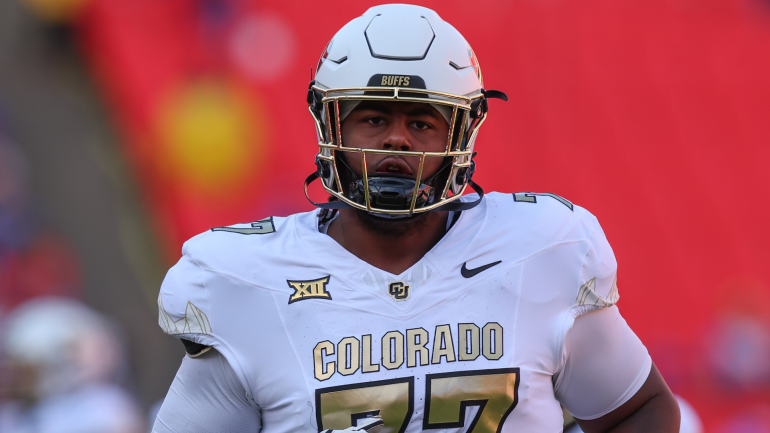
Colorado offensive tackle Jordan Seaton is the college football transfer portal’s best-available prospect after announcing entry with a goodbye letter. The 6-foot-5, 330-pounder was a five-star signee for Deion Sanders and Colorado as the gem of its 2024 recruiting cycle. He projects as one of the 2027 NFL Draft’s top prospects.
Seaton, the No. 4 overall transfer per 247Sports and the top offensive tackle, can expect quite the bidding war with NIL money.
“(His) reported asking price is around $2.5M,” 247Sports’ college football and transfer portal analyst Cooper Petagna said. “I would expect him to receive north of $3 million considering the number of tackle needy contenders.”
During his high-school recruitment, Maryland was in the mix for Seaton, a former Washington (D.C.) St. John’s College High star, as coach Mike Locksley developed a relationship with the massive blocker. The third highest-rated recruit in Colorado history, Seaton started all 22 games during which he appeared with the Buffalos.
Seaton’s exit is Colorado’s biggest loss this offseason. Seaton played 1,421 offensive snaps over his two-year stint, grading out at 67.2 as a true freshman in 2024 and 65.8 as a sophomore this season, via Pro Football Focus.
The Buffaloes lost more than three dozen players to the portal since their season-ending loss at Utah to finish 3-9.
“The thing about these guys man, you’ve got to understand when a guy leaves a program that selected him or picked him out of the portal, he leaves for a multitude of reasons,” Sanders said about Colorado’s expected roster changes. “The No. 1 reason people leave is money. It’s not a disdain for staff or a disdain for player, it’s money. Let’s just be honest man and stop sugar-coating this foolishness. That’s why most people leave.
“I admire the guys that want to go for another opportunity or bigger opportunity and play for a national championship … I applaud that, but that’s not the No. 1 reason people leave programs.”
NIL
Arizona State football ranks in middle of Big 12 in NIL dollars, agent says
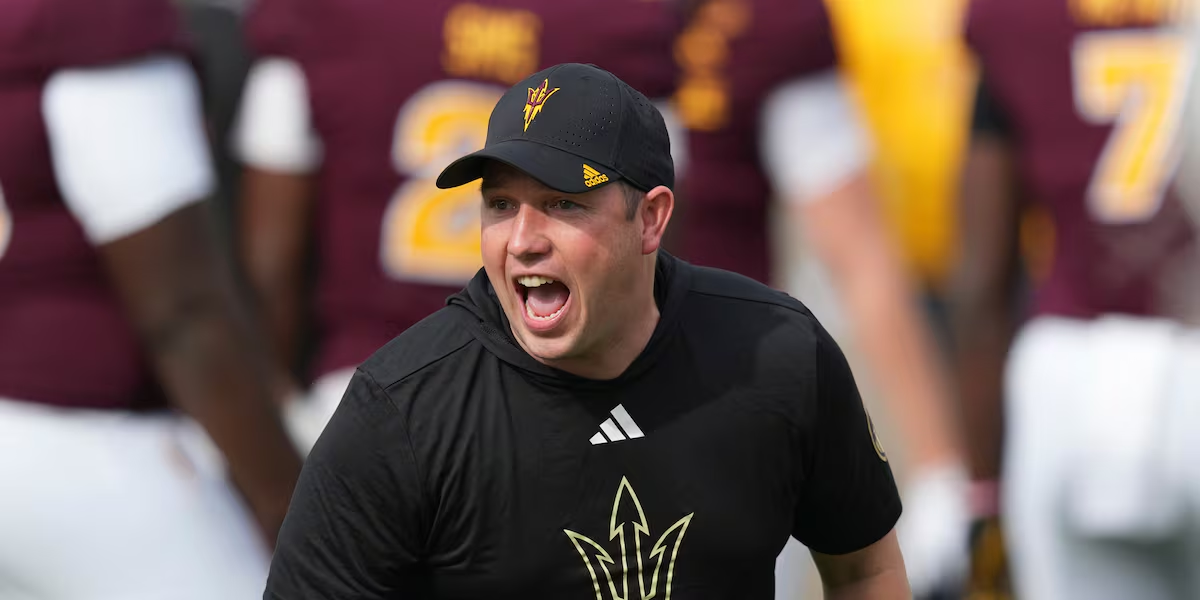
TEMPE, AZ (AZFamily) — Arizona State ranks somewhere in the middle of the Big 12 Conference for football name, image and likeness (NIL) spending, according to a Tempe-based agent.
Peter Boyle, founder and CEO of Activate Sports Management, said ASU has made significant progress since NIL rules were implemented in July 2021.
“If I were to guess based off what I see when you’re talking about football, which is primarily what people are talking, and men’s basketball,” Boyle said. “Keep in mind, there’s baseball NIL and softball NIL and volleyball. Those programs also have revenue share, although to a much lesser degree. But when it comes to football, I would put ASU somewhere in the middle of the Big 12.”
NIL transforms college sports
More than four years after NIL rules were first put in place, the impacts on college sports are becoming clear.
“It’s professional sports now,” Boyle said. “I have a kind of thing where, when my clients sign their first deal, I say welcome to professional sports. Like it is that.”
Boyle said contracts from some schools include incentive-based payments.
“You literally see contracts from some schools, not the Big 12, but I have clients across all different Power 4 schools that have, like, incentive-based payments in them,” he said. “Like, if you are the Big Ten Player of the Week, that’s another $10,000. So, these are professional sports contracts.”
When it comes to quarterback Sam Leavitt, Boyle believes his move to LSU is largely about money.
ASU’s NIL progress
Universities do not report their NIL dollars publicly, making exact comparisons difficult. However, Boyle said he has insight from running a NIL agency based in Tempe.
Three years ago, Boyle would have ranked ASU at the bottom of the pack. NIL dollars differ by conference, with SEC and Big Ten deals typically exceeding Big 12 amounts, though the gap has narrowed.
Boyle has insider knowledge from ASU athletes he represents.
“What they were making three years ago is what a lot of the roster makes now. And those are the top paid guys,” he said. “So it’s a notable difference for sure.”
Donations versus business deals
ASU football coach Kenny Dillingham recently spoke at Mountain America Stadium about finding a wealthy person in Phoenix who could give the football program $20 million. However, Boyle said large donations are not the answer.
“If a donor gives $20 million today, what does that do? It’s monopoly money,” Boyle said. “Because that’s not a business deal that has true business value that can be put into NIL go and pass the CSC. That’s a donation. That’s the old model.”
Boyle said a large donation could help offset revenue share costs and provide ASU more money for facilities, but if the university is playing by the rules, such a donation would not help with NIL deals.
Business deals are more important in college sports, according to Boyle.
“I think if businesses get involved and they can pass through the CSC and be true NIL deals, then there are certainly businesses that hopefully would get involved that would significantly increase ASU’s value provide above cap or above market deals,” he said.
Boyle said he expects the current NIL system to continue without significant changes and that fans should get used to the new landscape.
See a spelling or grammatical error in our story? Please click here to report it.
Do you have a photo or video of a breaking news story? Send it to us here with a brief description.
Copyright 2026 KTVK/KPHO. All rights reserved.
NIL
Here is the latest Big 12 Conference sports news from The Associated Press

The College Sports Commission has rejected nearly $15 million in name, image, likeness agreements since it started evaluating them over the summer, representing…
UNDATED (AP) — The College Sports Commission has rejected nearly $15 million in name, image, likeness agreements since it started evaluating them over the summer, representing more than 10% of the value of all the deals it has analyzed and closed. The CSC says it did not clear 524 deals worth $14.94 million, while clearing 17,321 worth $127.21 million. All the data was current as of Jan. 1. The numbers came against the backdrop of a “reminder” memo the commission sent to athletic directors last week, citing “serious concerns” about contracts being offered to athletes before they had been cleared by the commission through its NIL Go platform.
UNDATED (AP) — Arizona has tightened its hold on the top spot in The Associated Press men’s college basketball poll after Michigan’s loss to Wisconsin. The Wildcats received 60 of 61 first-place votes. Iowa State moved up to No. 2, followed by UConn, Michigan and Purdue. Nebraska moved up two spots to No. 8 to match its highest-ever ranking set in February 1966. Vanderbilt hit No. 10 for its first top-10 ranking since the 2011-12 preseason poll. No. 19 Florida, No. 22 Clemson, No. 23 Utah State and No. 25 Seton Hall were the new additions to the poll. Kansas, SMU and UCF fell out.
UNDATED (AP) — South Carolina climbed to No. 2 in the latest AP women’s basketball Top 25. The reshuffle follows a week where four of the top 10 teams lost. UConn is No. 1. LSU and TCU jumped into the top 10, with LSU moving to No. 6 after beating Texas. Texas dropped to fourth, while No. 5 Vanderbilt has its highest ranking since 2002. Maryland and Oklahoma fall out of the top 10, and Alabama, Notre Dame, and Illinois entered the poll. The SEC leads with nine teams in the Top 25.
Copyright 2025 Associated Press. All rights reserved. This material may not be published, broadcast, rewritten, or redistributed.
-

 Rec Sports2 weeks ago
Rec Sports2 weeks agoFive Youth Sports Trends We’re Watching in 2026
-
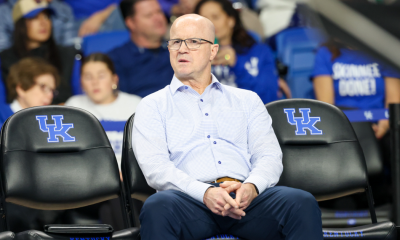
 Sports3 weeks ago
Sports3 weeks agoKentucky VB adds an All-American honorable mention, loses Brooke Bultema to portal
-

 Motorsports3 weeks ago
Motorsports3 weeks agoBangShift.com IHRA Acquires Historic Memphis Motorsports Park In Millington Tennessee. Big Race Weekend’s Planned For 2026!
-

 Sports2 weeks ago
Sports2 weeks agoH.S. INDOOR TRACK & FIELD: GLOW region athletes face off at Nazareth University | Sports
-
NIL3 weeks ago
Fifty years after IU’s undefeated champs … a Rose Bowl
-
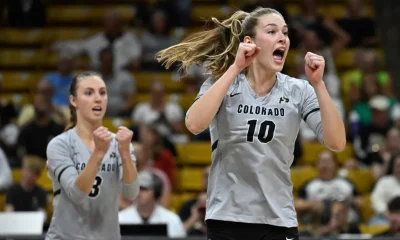
 Sports3 weeks ago
Sports3 weeks agoColorado volleyball poised to repeat success
-
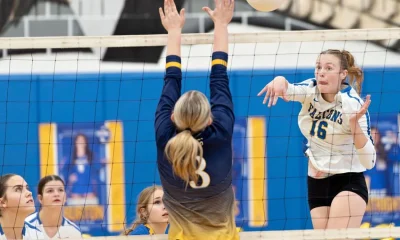
 Sports3 weeks ago
Sports3 weeks ago2025 Volleyball Player of the Year: Witherow makes big impact on Central program | Nvdaily
-

 Sports3 weeks ago
Sports3 weeks agoTexas A&M volleyball’s sweep of Kentucky attracts record viewership
-

 Motorsports3 weeks ago
Motorsports3 weeks agoKyle Larson opens door to 24 Hours of Daytona comeback – Motorsport – Sports
-
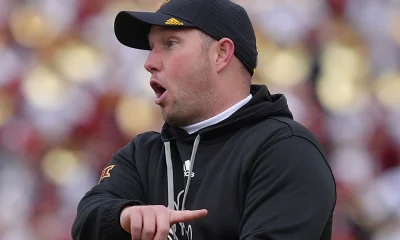
 NIL3 weeks ago
NIL3 weeks agoNIL Funds Are at Top of Arizona State’s Christmas Wishlist

































